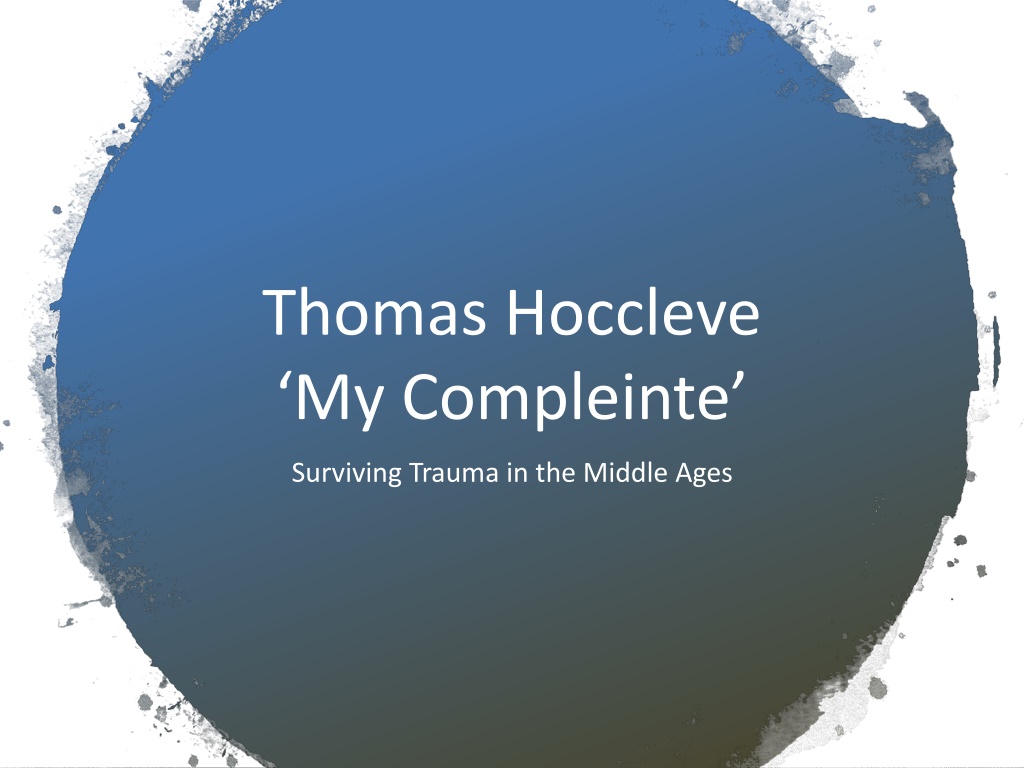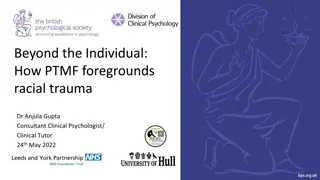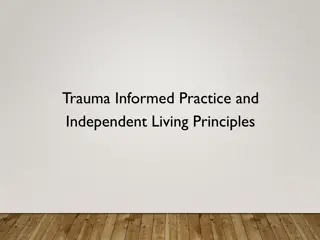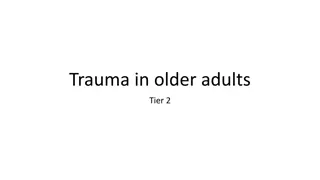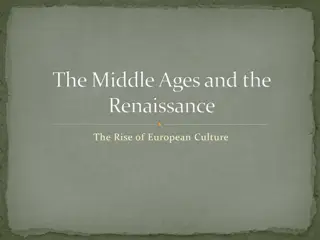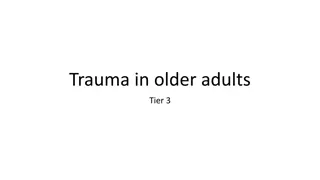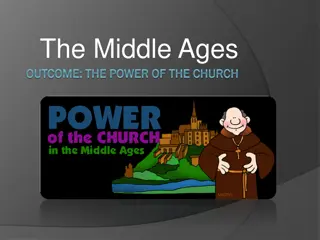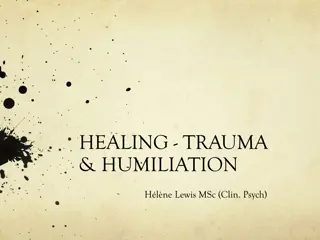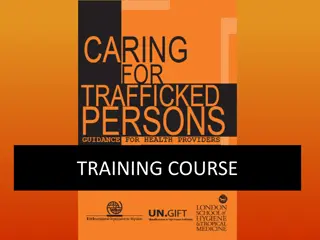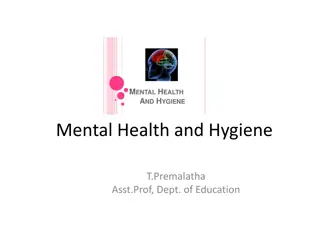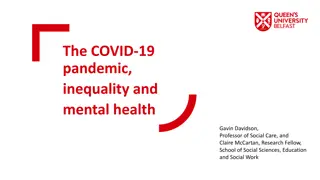Understanding Thomas Hoccleve: Surviving Trauma and Mental Health in the Middle Ages
Thomas Hoccleve, a scribe and clerk, dedicated works to future Henry V but faced a gap in records possibly due to mental illness. His series explores personal struggles and recovery. Scholars debate his depiction of mental illness and raw honesty in his works, drawing parallels to Chaucer. Hoccleve's fragmented self in his writings reflects a complex portrayal of the poet. International Hoccleve Recovery Day on Nov 1 aims to promote mental health awareness and celebrate Hoccleve's legacy.
Download Presentation

Please find below an Image/Link to download the presentation.
The content on the website is provided AS IS for your information and personal use only. It may not be sold, licensed, or shared on other websites without obtaining consent from the author. Download presentation by click this link. If you encounter any issues during the download, it is possible that the publisher has removed the file from their server.
E N D
Presentation Transcript
Thomas Hoccleve My Compleinte Surviving Trauma in the Middle Ages
Hoccleve Recovery Day Hoccleve tells us (55) he recovered on Alle Halwemesse (All Saints Day, Nov 1) International Hoccleve Society sponsors annual Hoccleve Recovery Day on Nov 1 Promotes awareness of mental health issues, and celebrates works of Thomas Hoccleve
Thomas Hoccleve (c.1368-1426) Scribe and clerk of the Privy Seal (numerous records survive) Dedicated Regement of Princes to future Henry V (c.1411-13) Gap in records c.1415-16 may coincide with period of mental illness Hoccleve s Series often read as attempt to re-integrate after illness [Image: from The Regement of Princes, British Library MS Arundel 38, f. 37]
The Series (c. 1421-22) Framed narrative sequence: Complaint, Dialogue with a Friend, Story of a Roman Empress, Learn to Die, Jonathas and Fellicula Narrates the process of its own composition, including advice by Friend Reflects on Hoccleve s role as a bureaucrat, and difficulties of finding patronage and pleasing audiences Highly personal tone and autobiographical fiction (see Burrow, Atkinson)
Hoccleve and Mental Illness No direct evidence of his illness outside of this text, though some indirect evidence supports it (see Linne Mooney) Some critics (e.g. Penelope Doob) point to conventional aspects of depiction of insanity Others (e.g. John Burrow) point out that convention and autobiography not mutually exclusive Long tradition of melancholia as inspirational and creative, but Hoccleve s first-person account is remarkable
Raw Honesty Like Chaucer, and with much of Chaucer s wry self-mocking irony, he is always talking about himself, but where Chaucer s persona is always a laughable fiction, Hoccleve uses Chaucerian precedent and techniques to talk, really, about himself, sometimes with such raw honesty as to be painful. Derek Pearsall, The English Chaucerians , in Chaucer and Chaucerians: Critical Studies in Middle English Literature (London, 1966), 233
Fragmented Self Spearing suggests there is a risk of entering too uncritically into the illusion that the poet and his painful human experience are somehow fully present in the words he wrote and there may be a danger of reading Hoccleve as a whole self back into a text in which he appears as a fragmented subject. A.C. Spearing, Medieval Autographies: The I of the Text (Notre Dame, 2012), p. 174
Hoccleve and Selfhood Notion of stable self disrupted: madness imagined as disconnect between my wit and I (59-60), idea of returning to self (64, 231-4, 247-9, etc) The experience of re-integrating is also painful as people refuse to accept he has recovered Lines 78-84: cites Psalms and image of broken vessel
Broken vessels In Trevisa s On the Properties of Things the article on passio melancolya states that some melancholics trowith that they beth erthene vessellis and dredith to be touched let they beth ibroke A.C. Spearing, Medieval Autographies: The I of the Text (Notre Dame, 2012), p. 185
Appearing before others The very way we walk, move, gesture, speak is shaped from the earliest moments by our awareness that we appear before others, that we stand in public space, and that this space is potentially one of respect or contempt, of pride or shame. Charles Taylor, Sources of Self, Cambridge Mass, 1989, p. 15; cited by Spearing, p. 183
The Mirror Hoccleve speaks of the deeply disturbing reactions of others as he attempts to re-integrate in society (see article by Bradley) Central image: standing in front of a mirror practising looking sane or normal (155-68) Looking at self in mirror, versus communing with others (216) Mirror is common medieval metaphor for literary texts
The Book Hoccleve draws consolation from the Bible, particularly the Psalms (lines 78- 84) Draws comfort from a book, Isidore of Seville s Synonyma, in form of dialogue with Reason Sees his own writing as helpful (in Dialogue, friend discourages him from publication) Fragmented reading experience (Karen Smyth)
Being objectivized The attitudes of others were wounding, but they may have assisted him to write about himself, because they would have enabled him to see himself as an object and thus a possible theme for words. In writing he adds the further perspective provided by the inner awareness of a person who knows that he is being objectivized. A.C. Spearing, Medieval Autographies: The I of the Text (Notre Dame, 2012), p. 184
As a scribe, many examples of handwriting survive Took effort to produce holograph versions of his own poetry Image: detail from Durham University Library MS Cosin V.III.9, f.95r Writing the Self The Hoccleve Archive: https://hocclevearchive.la.utex as.edu/the-holograph-mss/
Meta-Textual Hoccleve Profoundly self-conscious about process of writing the Complaint (and the Series) Throughout Series, engages in extensive discussions with Friend about what to write, what to publish, who to write for Extensive inter-textual allusions to Chaucer, Christine de Pizan and other earlier writers Series also reflects on future writing: how to (re)insert himself into a literary tradition
Time is out of joint (Hamlet, Act 1, sc. 5) Anelida and Arcite: history and recursive experience of trauma (Narrative) Anelida s Complaint : intricate, ornate and circular form as attempt to narrate trauma, or as evidence recursive experience of trauma? Trauma theory has long recognised trauma as profoundly disruptive of experience of time
Trauma and time It is not simply, that is, the literal threatening of bodily life, but the fact that the threat is recognized as such by the mind one moment too late. The shock of the mind s relation to the threat of death is thus not the direct experience of the threat, but precisely the missing of this experience, the fact that, not being experienced in time, it has not yet been fully known. Cathy Caruth, Unclaimed Experience: Trauma, Narrative, and History, Twentieth Anniversary Edition (Baltimore, MD: John Hopkins University Press, 2016 [1996])(64)
Hoccleve and Time Arguably, the Complaint (and the Series as a whole) confront Hoccleve s disrupted experience of Time Opening account of Autumn is not just response to Canterbury Tales, bur reflection on temporality itself (Karen Symth) Attitudes to time are at the core of Boethian responses to suffering
